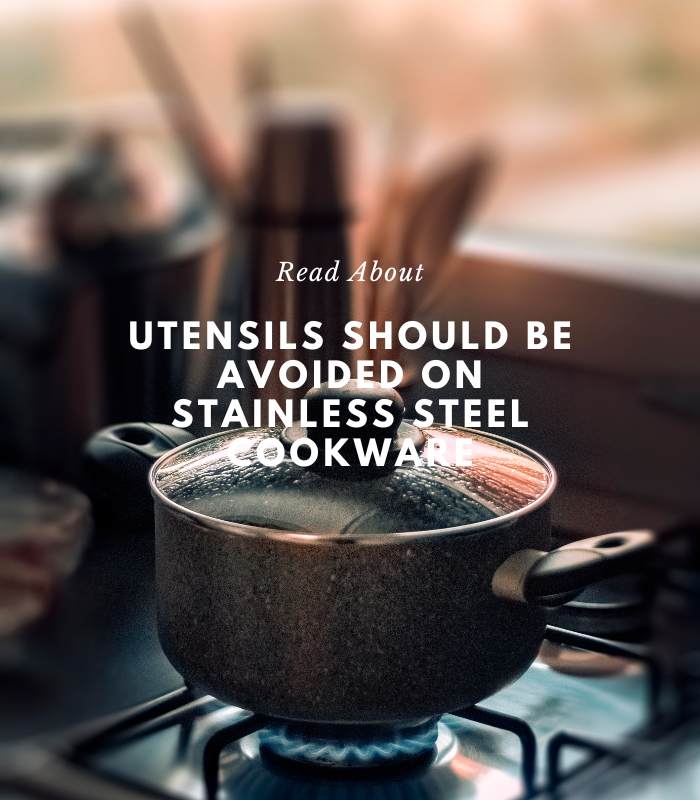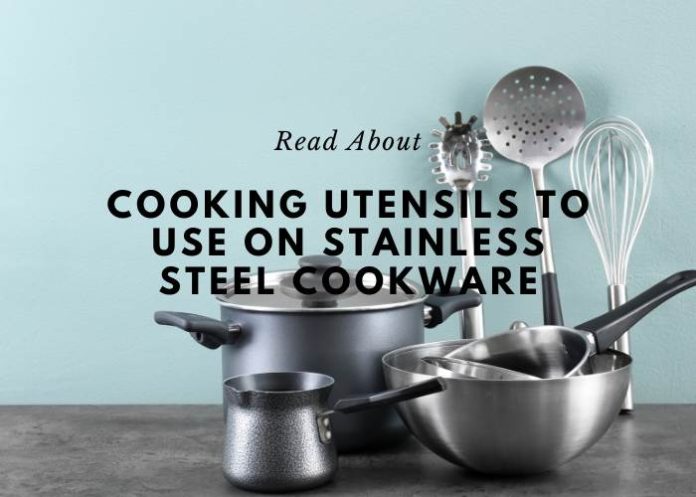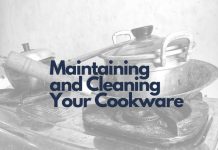If you frequently cook with stainless steel cookware, you might be curious about what Cooking utensils to use on Stainless Steel Cookware. Since stainless steel is so durable, almost any kind of best cooking utensils can be used on it without damaging the cookware. However, we will only recommend the best tools because we want to provide you with the possible options.
You are free to make use of nylon, wooden, bamboo, or even silicone utensils when you are cooking with your stainless steel cookware. They are safe, and we’ll see why you should use them. Additionally, you’ll also find a list of materials that you can’t use.
Overview of Stainless Steel Cookware
Cookware made of stainless steel appears to be the fanciest, shiniest, and most expensive of any other kind (equal only to copper in aesthetics). Yet beyond its aesthetic appeal, stainless steel is an excellent material for cookware because it is long-lasting, simple to clean, and does not transfer any undesirable metals into the food it prepares.
The addition of chromium to steel creates the material known as stainless steel. The chromium content distinguishes stainless steel as a superior metal for cookware and other practical applications. In addition, the chromium in the metal will oxidize when exposed to air, which will cause a tough coating to grow on the surface of the metal. Because of this oxide layer protects stainless steel from rusting, corrosion, and leaching, making it an excellent material for cookware because it is safe and long-lasting.
What Cooking Utensils to Use On Stainless Steel Cookware?
The cooking utensils below are best suited for use on Stainless Steel Cookware. These are the common materials for cooking utensils. You can use anything made of those materials on your stainless steel cookware. In the next section, we’ll see what not to use.
- Wood: These utensils are designed to be used in a wide variety of settings, particularly while very hot items are being prepared in the kitchen. Wooden spoons are exceptionally heat-resistant, so you won’t have to worry about your hands getting burned while you’re in the kitchen using them. When it comes to stirring liquids in pots or tossing food in pans, wooden spoons and spatulas are ideal since they are delicate yet simple to manipulate. Nonetheless, despite their rigidity and sturdiness, they are not harsh or scratchy, allowing you to control the situation completely.
- Bamboo: The cooking utensils made from bamboo are heat-resistant, long-lasting, and biodegradable, which means that when you finally dispose of them, you can rest assured that they will decompose completely. In addition, bamboo instruments have a high level of resistance to liquids, stains, and scents, which makes them resistant to bacteria and simple to clean.
The best time to use bamboo cookware is when you want to cook without scratching your pots, pans, or other cookware. Cookware made of bamboo is not only resistant to scratches but also does not cause a significant amount of scratches. If you need to be rougher and tumble with your stainless steel items, then bamboo utensils are the greatest choice you have available to you.
- Silicone: The Silicone Cooking Utensil is the right choice for you to make if you intend to prepare food at a high temperature, as the utensils can withstand the heat without breaking down. In addition, they can be baked twice to ensure that the tools won’t be stained or smelly after you’ve finished using them in the kitchen.
Which Cooking Utensils Should Be Avoided on Stainless Steel Cookware?
Although you can use the most type of utensils on your Stainless Steel Cookware, it’s better to avoid aluminum, stainless steel scrubber, or metal utensils as they can cause significant damage to your Stainless Steel Cookware.

Aluminum
Cookware made of aluminum was very popular in the last few decades, but subsequent research has demonstrated a link between the material and Alzheimer’s disease. Therefore, cooking utensils made of aluminum should be avoided at all costs, as culinary specialists recommend.
Various metals and materials have distinct chemical reactions when they come into contact with one another, which prevents the use of certain tools. For example, any cooking utensils made of aluminum won’t work because the combination of metals will cause galvanic corrosion. This is because electrons move from one material to another during galvanic corrosion. This movement of electrons is what causes galvanic corrosion.
The transfer of electrons from the metal to the stainless steel will lower the shelf life of your aluminum utensils while prolonging the shelf life of your stainless steel cookware if you have stainless steel and aluminum utensils in your kitchen.
Stainless Steel Scrubbers
You shouldn’t use stainless steel scrubbers to clean a pan made of the same material since those scrubbers can leave very fine scratches on the pan. This is due to the fact that stainless steel can be scratched by a scrubber made of stainless steel. A soft sponge should clean the surface properly rather than a scratchy scrubber.
In addition, regardless of what the internet may lead you to believe, you should never put pots and pans made of stainless steel in the dishwasher since these items are never safe. Instead, thoroughly clean your pots and pans with soap, water, and a soft scrubber, and you won’t need to worry about anything.
Metal
Even though they may be helpful, you should avoid metal utensils if you want your stainless steel cookware to maintain its perfect appearance. Using metal utensils can leave superficial scratches on your lovely stainless steel, but this won’t significantly damage the material.
Another crucial piece of advice you need to keep in mind is the possibility that metal utensils will become extremely hot and may cause burns on your hands if they come into contact with them. Because of this, you ought to look for metal utensils with silicone handles to protect yourself from getting burned.
Teflon
One of the most well-known and widely used brands of non-stick-coated cookware is Teflon. When the pan was heated too high, the non-stick cookware would release a substance known as perfluorooctanoic acid (PFOA). In addition, the fumes from Teflon pans that have been cooked to high temperatures can produce a sickness known as polymer fume fever. Chills, a fever, headaches, and nausea are all signs that you may be suffering from fume fever.
Copper
Cookware made with copper is not only costly, but it also contains another mineral that is poisonous and has the potential to leach into acidic foods.
Keep in mind that you should not purchase any cookware that is made of any of the materials that were listed above.
Closing Words
We have provided a solution to the question of what Cooking utensils to use on Stainless Steel Cookware. Stainless steel is an exceptionally long-lasting material; all you need to do is select the appropriate cooking utensils, considering not only your comfort level but also the dish you are preparing. The outcome of everything will be satisfactory, and you will be able to derive maximum utility from both your cookware and your pan. However, as all of the utensils mentioned above have some pros and cons, you must choose knives for use in Stainless Steel Cookware that best serve your needs.




